 Petzlover
Petzlover Fila Brasileiro is originated from Brazil but Samoyed is originated from Russia. Fila Brasileiro may grow 15 cm / 6 inches higher than Samoyed. Fila Brasileiro may weigh 50 kg / 111 pounds more than Samoyed. Both Fila Brasileiro and Samoyed has almost same life span. Both Fila Brasileiro and Samoyed has almost same litter size. Both Fila Brasileiro and Samoyed requires Moderate Maintenance.
Fila Brasileiro is originated from Brazil but Samoyed is originated from Russia. Fila Brasileiro may grow 15 cm / 6 inches higher than Samoyed. Fila Brasileiro may weigh 50 kg / 111 pounds more than Samoyed. Both Fila Brasileiro and Samoyed has almost same life span. Both Fila Brasileiro and Samoyed has almost same litter size. Both Fila Brasileiro and Samoyed requires Moderate Maintenance.
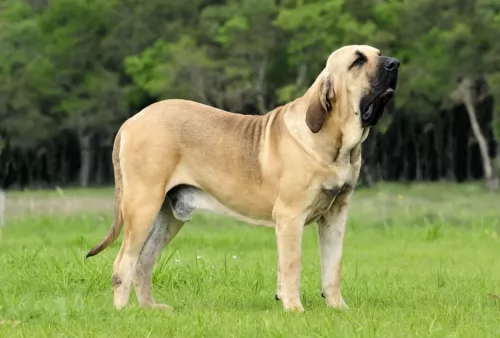 Hailing from Brazil, and known also as the Brazilian Mastiff, nobody seems to be too sure of the exact origins of the large Fila Brasileiro but it is believed to be a cross between the English Mastiff, the Bulldog and the Bloodhound.
Hailing from Brazil, and known also as the Brazilian Mastiff, nobody seems to be too sure of the exact origins of the large Fila Brasileiro but it is believed to be a cross between the English Mastiff, the Bulldog and the Bloodhound.
Other theories are that the dog comes from a mix of Portuguese and Spanish dogs and that they were bred to guard livestock from predators. Breeds that have no doubt contributed to the modern Fila are the Bullenbeisser, the Bloodhound, Mastiff and Rafeiro do Alentejo. All these dogs have characteristics such as excellent working dog skills, herding instincts as well as courage and tenacity.
The official Brazilian breed standard of the Fila was developed in the 1960s and the Fila Brasileiro Club of America was formed in 1984.
 The Samoyed is a large breed of dog; a spitz-type dog, with a thick, double-layer coat. The dog was used to help with herding and to also haul sledges for the Siberian Samoyede people.
The Samoyed is a large breed of dog; a spitz-type dog, with a thick, double-layer coat. The dog was used to help with herding and to also haul sledges for the Siberian Samoyede people.
The Samoyed has been used in polar expeditions, including Sir Ernest Shackleton's journey to the Antarctic. They’ve put up with a lot of hardships on these journeys and some of them have lost their lives on these expeditions.
The first standard for the breed was adopted in England in 1909, and in 1923 the original Samoyed Club of America was established.
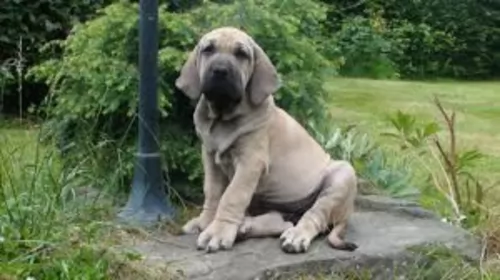 With his huge head covered in loose skin much like that of a Blooohound, and a body resembling that of a Mastiff, the large heavily built Fila Brasileiro is a mastiff breed from Brazil. He stands at 60 to 75cm in height and he weighs roughly 55 to 80kg.
With his huge head covered in loose skin much like that of a Blooohound, and a body resembling that of a Mastiff, the large heavily built Fila Brasileiro is a mastiff breed from Brazil. He stands at 60 to 75cm in height and he weighs roughly 55 to 80kg.
The ears of the Fila are large and droop down or are folded back, depending on his mood. The tail is long and slim. The coat of the dog is short and dense with the texture being quite smooth and soft. Colours of the coat can vary from solid fawn or black to red to brindle.
Perhaps the huge Fila wouldn’t be a good choice as a pet for the first-time inexperienced dog owner as he is a powerful, intelligent, self-assured, headstrong animal that will certainly need to have training and socialization if you want him as an obedient pet in your home.
He is a dog known for his courage and bravery. The Fila is loving and affectionate with his human family, being protective of them and not being too friendly with strangers. He isn't a particularly good pet choice with children in the home.
Some people, after buying a cute Fila puppy, put him out in the yard when he becomes large, and then they pretty much neglect him. This is cruel and irresponsible as he is a social, playful dog who wants to be part of his human family.
These dogs have some aggression in them and this makes them good watchdogs. They generally don’t show aggression towards their family but may snap at a stranger who tries to touch as he feels threatened.
 The Samoyed is a large herding dog standing at between 48 to 60cm in height and weighing 16 – 30kg. He has a thick, double layer coat that is silvery white.
The Samoyed is a large herding dog standing at between 48 to 60cm in height and weighing 16 – 30kg. He has a thick, double layer coat that is silvery white.
The top layer is fairly long and coarse. The dog sheds heavily once or twice a year, but the dog is described as being hypoallergenic.
The ears of the dog are typical spitz-like – erect. The eyes of the dog are almond in shape and while they are usually brown, they can sometimes be blue too. The tail is long and curls over the dog’s back. When these dogs sleep in the snow, you might notice the tail is folded so that it covers the dog’s nose.
The Samoyed is a friendly dog, to such an extent that you wouldn’t call him a good watchdog. They’re friendly dogs with happy expressions on their faces. They make great family pets and will get on well with children as well as other dogs in the home.
Like all dogs, the Samoyed will need early training and socialization to make him obedient and well rounded. He is intelligent and can easily learn a few basic commands.
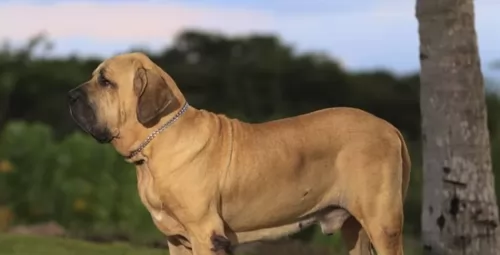 The Fila Brasileiro or Brazilian Mastiff is a powerful dog and it is believed that a large dog like this can be a danger to people if he isn’t trained and socialized.
The Fila Brasileiro or Brazilian Mastiff is a powerful dog and it is believed that a large dog like this can be a danger to people if he isn’t trained and socialized.
He is therefore not recommended for first time dog owners or homes with small children. He is a dog that is particularly wary of strangers too.
When he has been properly socialized he can be loving, loyal and obedient because it is essentially how a dog is brought up as to how he turns out.
If you bring one of these big, beautiful dogs into your home, have him socialized as a puppy, treat him firmly, but kindly and you could have yourself an extraordinary pet.
 The Samoyed is a gentle, easy going dog that gets on well with everyone, loving children and being prepared to be friendly towards other dogs too.
The Samoyed is a gentle, easy going dog that gets on well with everyone, loving children and being prepared to be friendly towards other dogs too.
His friendliness makes it that he doesn’t make a good watchdog. He is intelligent and can be trained to obey basic commands.
He loves plenty of exercise, after all he has always been a working dog. Apart from the coat which will require quite a bit of upkeep, the Samoyed is prepared to come into your home and make you a splendid pet and companion.
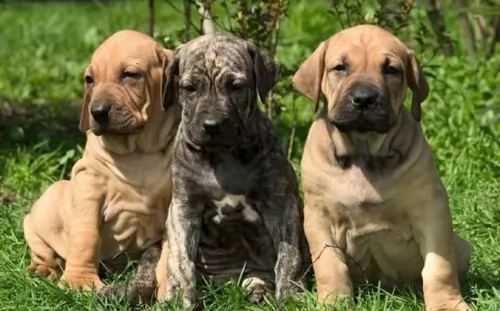 Filas are a dog breed who have a high rate of hip- and elbow dysplasia. This is a serious disease which can lead to lameness with your pet. Other orthopedic diseases with the breed include osteochondritis and luxating patella.
Filas are a dog breed who have a high rate of hip- and elbow dysplasia. This is a serious disease which can lead to lameness with your pet. Other orthopedic diseases with the breed include osteochondritis and luxating patella.
Also, as a deep-chested dog breed, your Fila also is at risk of getting the very serious gastrointestinal syndrome known as bloat. This is a common condition that can prove deadly for your pet. The Fila’s stomach will fill with gas, putting pressure on other organs and stopping blood flow to the heart and difficulty with breathing. Sometimes the stomach will twist. Get him to the vet immediately if you notice a swollen stomach, drooling or restless behaviour.
 Dogs can get diabetes just like people can. Diabetes is becoming more common in dogs as people try and feed their dogs ‘treats’ such as chocolates, biscuits and ice-cream.
Dogs can get diabetes just like people can. Diabetes is becoming more common in dogs as people try and feed their dogs ‘treats’ such as chocolates, biscuits and ice-cream.
Fortunately diabetes is manageable. Certainly, if you discover signs of diabetes in your pet, get him to the vet. The typical symptoms of diabetes in dogs are increased urination, increased thirst and weight loss. Cataracts and blindness can also occur.
Glaucoma is when there is increased pressure in the eye. It can be hereditary or secondary where there is decreased fluid in the eye because of other eye diseases. Symptoms include pain and even vision loss. It can be treated surgically or with eye drops.
This is an inherited condition in dogs where the thighbone doesn't fit properly into the hip joint. Some dogs will even have lameness in both rear legs. The vet will want x-rays to diagnose hip dysplasia. Unfortunately arthritis can also develop.
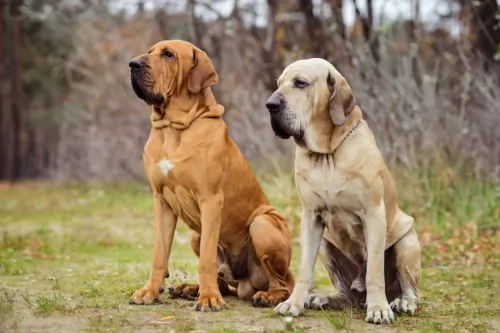 The Filas size makes it important that he have a good amount of exercise if you want to maintain his health and happiness. He isn’t a dog suited to city life as he is too large and will irritate his owners when cooped up in a tiny space with them. He isn’t demanding when it comes to exercise and activities all the time, but he should still be exercised regularly as he is inclined to become lazy .
The Filas size makes it important that he have a good amount of exercise if you want to maintain his health and happiness. He isn’t a dog suited to city life as he is too large and will irritate his owners when cooped up in a tiny space with them. He isn’t demanding when it comes to exercise and activities all the time, but he should still be exercised regularly as he is inclined to become lazy .
Moderate shedding. Regular brushing twice a week will be required. Check ears for infection and brush his teeth 2 or 3 times a week.
Nothing is set in stone as to what to feed your Fila Brasileiro, but a large dog will require quality food with a good amount of protein and fat according to size, age and activity levels.
Because a large breed dog is prone to hip dysplasia, look out for ingredients such as chondroitin and gludosamine which are specifically good for joint health. Try and avoid commercially manufactured food with common allergens such as soy, corn and wheat, artifical flavors and fillers.
A source of cooked rice, chicken and vegetables as well as some raw meat will be excellent for your big pet. Make sure he is never deprived of fresh, cool drinking water.
 The coat of the dog is super thick and in the Spring, the dog sheds a lot. Samoyed dog owners will need to be regular with their brushing routine with these dogs as the coat can easily tangle. Some people just prefer to get their Samoyed to a professional groomer.
The coat of the dog is super thick and in the Spring, the dog sheds a lot. Samoyed dog owners will need to be regular with their brushing routine with these dogs as the coat can easily tangle. Some people just prefer to get their Samoyed to a professional groomer.
This is a working dog, used to working hard in all kinds of conditions. He doesn’t take kindly to being bored with nothing to do and he howls and barks till you take him on a walk. He requires regular exercise such as hiking, ball games, running and swimming. It is why this dog isn’t suited to life on a small property in the city. He requires a large garden or farm and lots of exercise.
If you want your Samoyed to be healthy so that you’re not constantly at the vet, provide him with top quality food. It is always useful and convenient having commercially manufactured food but you want to vary the diet just a bit by providing some homemade food too.
If you boil chicken, brown rice or pasta and spinach, sweet potatoes and carrots in a pot you can chop it all up and freeze it and feed portions twice a week to your dog. Warmed up it can be added to his dry kibble and be a wonderful tasty treat for him. Every now and then you can also include some raw meat which can be beneficial for his skin. Ensure there is always a bowl of fresh, cool water within his reach.